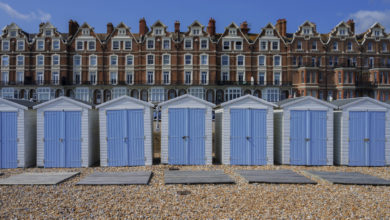Property Investment
Fears of House Price Drop Grow as Lenders Withdraw Hundreds of Mortgages

Predictions that the Bank of England base rate will hit six per cent next year have sparked a whole swathe of lenders to withdraw hundreds of mortgages with HSBC, Santander and NatWest among the major lenders to change their offerings. This has led to fears that mortgages will soon become unaffordable for many, leading to demand, and thus house prices, to fall.
“Mortgage approvals are starting to slide, driven by the increasing monthly cost of a mortgage pricing many buyers out of the market. Buyers can no longer match the inflated pandemic price expectations of many sellers and it’s only a matter of time before this adjustment causes house prices to decline,” Managing Director of HBB Solutions, Chris Hodgkinson explained.
What Caused Market Confidence to Fall?
The new Chancellor of the Exchequer Kwasi Kwarteng announced a huge increase in government borrowing to fund £45billion of tax cuts designed to boost growth just over a week ago in his mini-budget, however rather than restoring confidence in the UK economy, fears the new Government’s policy would send inflation rocketing and the Bank of England (BoE) Base rate to rise to levels not seen for over 20 years, drove the value of the UK pound to an all-time low. A weaker pound means all of the goods we import from abroad cost us more, which if not addressed, will drive inflation even higher.
The BoE had only just increased the base rate by 0.5 per cent to 2.25 per cent to counter already rising inflation however the market shock caused by the mini-budget has led to expectations that the UK’s central bank will need to increase rates significantly (to 6%) in the coming months to reduce inflation from its current level of 9.9 per cent to the Government’s target level of 2 per cent.
The market reaction to the budget even forced the BoE to issue an emergency statement pledging to increase rates by “as much as needed” to control the nation’s increasing inflation. It also stepped in to buy £65billion of Government debt saying that it would buy as many long-dated government bonds as needed between now and 14 October in an emergency bid to prevent “material risk” to the UK economy and stabilise financial markets as the loss of confidence in Government bonds (often known as gilts) had a direct impact on the cost of pensions sparking mass sell-offs.
How will rising rates affect property investors?
Base rates as high as six per cent would send home loan costs spiralling for UK mortgage holders. Fears of a sudden and significant interest rate rise have seen the nation’s mortgage holders and property buyers scrambling to secure a mortgage deal from the limited ones available before any more are withdrawn or prices are increased.
Rachel Springall, Finance Expert at Moneyfacts.co.uk, said: “The mortgage market has seen relentless rate rises this year, and borrowers coming off a fixed mortgage will find the cost to secure a new deal is much higher than they were perhaps anticipating. This could not come at a worse time amid a cost-of-living crisis when household budgets are stretched.”
Are property prices set for a fall?
House price growth slowed to single digits (9.5%) in September from 10 per cent in August while month-on-month prices were unchanged, according to the latest Nationwide House Price Index. Although the changes were negligible, Nationwide’s analysts point out that this was the first month not to record a sequential rise since July 2021.
Commenting on the figures, Robert Gardner, Nationwide’s Chief Economist, said: “The slowdown to date has been modest and, combined with a shortage of stock on the market, this has meant that price growth has remained firm.
“However, headwinds are growing stronger suggesting the market will slow further in the months ahead. High inflation is exerting significant pressure on household budgets with consumer confidence declining to all-time lows.”
James Forrester, Managing Director of Barrows and Forrester, made light of the market jitters: “In any other market, such high rates of annual house prices growth would be lorded as proof of a property market boom. But, we’ve become so accustomed to seeing regular double-digit rates of growth that any marginal slowdown is now sparking fears that a crash is imminent.
This simply isn’t the case and we’re yet to see any definitive proof that the tide is starting to turn from boom to bust.”
Iain McKenzie, CEO of The Guild of Property Professionals, added: “While the current economic crisis is likely to impact mortgage rates, a sudden crash in the market is not as likely as some economists are forecasting.
Estate agents are still seeing stock shortages in many areas of the country, something which has supported elevated house prices throughout the boom.
“The government’s stamp duty cut may well have the effect of mitigating spiking finance costs, but question marks remain over how high interest rates will climb.”
What’s Next for Interest Rates?
The Bank of England’s next Monetary Policy Committee will meet to decide on any interest rate rises on Thursday 3rd November. Previously they made their interest rate decision without all of the facts because the Government’s mini-Budget was not accompanied by the customary independent assessment from the Office for Budget Responsibility (OBR), which an official Budget would have required. In fact, the OBR’s provisional assessment on the impact of the Government’s policies on the economy will not be published until 7 October.
However, the bank’s Monetary Policy Committee (MPC) has made clear its agenda in its recent statement: “The role of monetary policy is to ensure that demand does not get ahead of supply in a way that leads to more inflation over the medium term. As the MPC has made clear, it will make a full assessment at its next scheduled meeting of the impact on demand and inflation from the Government’s announcements, and the fall in sterling, and act accordingly. The MPC will not hesitate to change interest rates by as much as needed to return inflation to the 2% target sustainably in the medium term, in line with its remit.”
So, it seems we will have to wait until the committee’s meeting in November to see if the Government’s growth policy and the BoE’s quickfire reaction to stabilise the pensions market were enough to stabilise the market or if they feel more rate rises are required…











